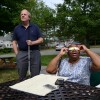There was a time when the merger of two massive radio chains would have occasioned apocalyptic warnings about corporate media monopolies. Yet the announcement earlier this month that Entercom and CBS Radio would seek to combine their forces into a nationwide 244-station chain — with huge implications for Boston — barely created a stir.
Yes, both The Boston Globe and the Boston Herald had some fun kicking around the possibility that the city’s two big sports stations, Entercom’s WEEI (93.7 FM) and CBS’s The Sports Hub (98.5 FM), could wind up under the same roof. But we seem to be many years past the time when we worried about the effect of out-of-state ownership on local communities. It was a topic I wrote about repeatedly in the '90s (here’s anexample from 1997), and now it’s yesterday’s news.
Of course, there have been massive changes in the radio landscape. Many people who used to tune in for music now listen on their phones or MP3 players, or, if they’re really retrograde, on CDs. Podcasts have gone mainstream. News and public affairs have largely been banished from commercial radio, with listeners flocking to public stations such as WBUR (90.9 FM) and WGBH (89.7 FM) — though CBS’s WBZ (AM 1030) is a notable exception, and worth worrying about under new ownership.
Despite all these changes, traditional radio remains a big business. According to the Pew Research Center’s State of the Media report for 2016, Nielsen has found that 91 percent of Americans age 12 or older listen weekly.
Pew also found that even though internet and satellite radio audiences are growing, that has had little effect on traditional radio listenership. The growth curve in online car listening through cellphones is actually slowing down, which may be a reflection of the limited data plans most of us have. That represents a real challenge for ventures such as Boston Herald Radio and the Globe’sRadioBDC.
The Entercom-CBS deal itself is something to behold. In his must-read Northeast Radio Watch newsletter (note: the newsletter requires a subscription), Scott Fybush writes that the combined group would have to spin off two FM stations in Boston in order to stay under the legal limit of 10 in one market.
What’s worrisome is that Entercom will be in the driver’s seat after the merger, and the CBS stations tend to be of higher quality. WBZ remains a jewel — a breaking-news station with a powerful signal, plus Dan Rea’s fine talk show at night — and if there is an analog to WBZ, it is WRKO (AM 680), which Entercom has run into the ground since Jerry Williams’ heyday in the 1980s and '90s.
WRKO’s former ratings king and Herald columnist Howie Carr now appears on the station through his own syndication service. One recent afternoon I heard ads for gun lockers, survival gear, and a public-service announcement asking for a moment of silence on the 10th anniversary of the 9/11 terrorist attacks. I’m not good at math, but I’m pretty sure that was more than five years ago.
WEEI and The Sports Hub are more evenly matched, but it took the latter’s entry into the market seven years ago to force Entercom to up its game — including moving from a weak AM signal to its current place on the FM dial.
The real danger is that new management will mess with WBZ. As Fybush, a WBZ alumnus, writes, Entercom will be inheriting news stations in New York and Philadelphia as well as Boston. “Will the company be willing to make the continued investment needed to keep its all-news jewels healthy?” asks Fybush. “How much of the existing CBS management will stay? And how much of the $25 million in cuts that Entercom plans to make will come out of those expensive newsrooms?”
I suspect the lack of interest in all this is largely a function of the widespread belief — probably correct — that though commercial radio may still be reasonably healthy at the moment, it is just one technological breakthrough away from being cast into oblivion. For instance, if someone comes up with truly simple internet radio that you can listen to in your car without incurring data charges, well, that’s it for FM and AM.
Meanwhile, though, this stuff matters. Radio is still where we get a lot of our news and information, and not everyone is an NPR listener. There was a time when Congress and the FCC understood the importance of localism in radio. Those days are long gone.
Unfortunately, no matter who comes out the winner in all this, there’s little doubt as to who loses: the public.




